Dental Implants – Springdale, AR
Laying the Roots for a New Smile

Dentures and bridges replace the crowns of your teeth – that is, the parts that you see in the mirror when you smile. However, dental implants are different; they replace the crowns and the roots of your teeth, making them a far more comprehensive tooth replacement solution. Here at Sunset Avenue Dental, we can handle every step of the dental implant tooth replacement procedure in-house. Give Dr. Bollin a call today to set up a consultation to discuss the benefits of replacing missing teeth with dental implants at our Springdale, AR dental office..
Why Choose Sunset Avenue Dental for Dental Implants?
- Dental Implants Placed In-House
- Dentist That Values Efficient Treatment
- Excellent Customer Service from Friendly Team
What are Dental Implants?

Dental implants are made up of three parts: a biocompatible post shaped like a screw, a metal abutment, and a restoration. The post is surgically inserted into the jawbone so that it can act as a new tooth root. The restoration is designed to mimic the appearance of your natural teeth and is what you’ll use to eat, speak, and smile. The metal abutment is what allows us to attach the dental restoration to the dental implant post.
The 4-Step Dental Implant Process

Dental implants offer one of the most effective and comprehensive treatments for rebuilding missing teeth. Due to its multi-step process—which can take several months to finish—you can be sure to have the highest chance of a successful procedure for a smile you can rely on for a lifetime. Our team at Sunset Avenue Dental performs the entire treatment in-house, that way you don’t have to worry about traveling across town to get the tooth replacement you deserve. Read on to learn about the four main steps of the dental implant process.
Initial Dental Implant Consultation

The first step is to schedule a dental implant consultation, where we can confirm your candidacy for dental implants and plan your treatment according to your needs. This appointment will involve assessing your smile and facial structures, such as your jawbone density, to see if your oral health is in good condition to support the titanium posts. We’ll also go over the entire process and provide you with a cost estimate of the treatment.
Some patients may require preliminary procedures before moving forward with getting dental implants. These may include gum disease therapy, tooth extractions, and bone grafting. After we’ve optimized your oral health, we’ll be able to develop the remainder of your treatment plan.
Dental Implant Surgery

Once all of the necessary preparations have been made, we can schedule the surgery to place your dental implants. Thanks to Dr. Bollin’s advanced training, our team can handle the process in-house instead of referring you to a specialist.
To begin, we’ll completely numb your mouth with local anesthesia to help you stay pain-free throughout the visit. Then we’ll make a tiny incision in your gums to reach your jawbone where we’ll place the implants in the exact location and angle necessary to match the rest of your smile. The final portion involves suturing the gum tissue around the posts and placing a dental cap on top of them to keep them protected while you recover.
Dental Implant Osseointegration & Abutment
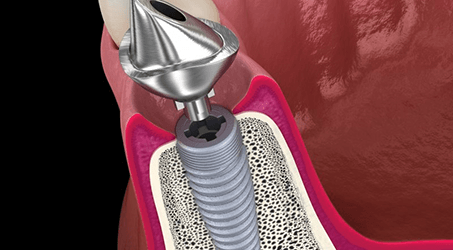
After surgery, it takes about three to six months for implant posts to fuse with the jawbone via osseointegration. This is what will provide the superior stability necessary for a lifelike bite. Once we’ve determined that your mouth has properly healed, we can perform a second, smaller procedure to attach an abutment—the small metal connector that will link the restoration to your implant. Then you’ll need to take some time to allow your gums to heal.
Delivery of Dental Implant Restoration(s)

Finally, after you’ve recovered from getting your abutment, we can take an impression to design your final restoration, which will be made at a separate dental lab and attached to your implant post during one last appointment. On this visit, you’ll receive your new dental crown, bridge, or denture. We’ll double-check to see that your bite is comfortable and satisfactory before sending you on your way to enjoy your fully rebuilt smile.
Benefits of Dental Implants

In recent years, dental implants have become perhaps the most popular way to replace lost teeth. Dentists now place as many as 500,000 of these unique restorations yearly! The main driver of this popularity seems to be dental implants’ unique placement method. Due to how they’re placed, they have special advantages that other restoration options don’t. If you’d like to learn about the benefits of dental implants, Sunset Avenue Dental will gladly share them; just keep reading or book a visit.
Day-to-Day Benefits

As you’d expect, the most notable perks to dental implants are the day-to-day ones. These include:
- Gorgeous Results – Since dental implants are capped with porcelain, they blend with your whole smile. They match your other teeth in color, size, and shape, resulting in a gorgeous look.
- Simpler Oral Care – Dental implants are much easier to clean than dentures or dental bridges. You can simply clean them like natural teeth via twice-daily brushing and once-daily flossing.
- Easier Eating – Once they fuse with your jaw, dental implants restore your bite force. That means they’ll help you eat tough foods again!
- Boosted Confidence – By restoring your smile, dental implants can boost your confidence and body image. You’ll likely feel more self-assured when you socialize with friends and family.
Health Benefits

Dental implants also have their fair share of health-related upsides. Some of the most notable ones are:
- Good Oral Health – If left to themselves, smile gaps let harmful oral bacteria build up in your mouth. That means they’ll put you at greater risk of tooth decay and gum disease. Luckily, dental implants can fill those gaps and thus improve your oral health.
- A Stronger Jaw – Tooth loss normally causes your jawbone to erode, leading to a facial collapse over time. However, dental implants prevent (and reverse) this erosion to keep your jaw strong.
- Support for Other Teeth – Unaddressed smile gaps will slowly tilt your other teeth until they fall out. That said, dental implants fill those spaces to prevent such tilting.
- Better Nutrition – Dental implants grant more dietary options due to restoring your bite force. That range then boosts your nutritional health.
Long-term Benefits

Lastly, keep in mind that dental implants even have long-term benefits. These perks are:
- High Success Rate – When placed by qualified dentists, dental implants nearly always succeed in the long run. It’s to the point that their 10-year success rate is 98%!
- Lasting Effects – The average dental implant usually lasts 15-20 years. On the other hand, a well-maintained one can reach a lifespan of 30+ years. Either way, implants can potentially work for a lifetime.
- Long-term Savings – So long as you care for them, dental implants will save you money. Their long lifespans (see above) mean they rarely need repairs or replacements. So, you won’t pay as much for follow-up work as you would if you had dentures or dental bridges.
Who Dental Implants Can Help

If you’re an adult that’s in overall good oral health and has a jaw with enough bone tissue to support an implant post, chances are that you’re a good candidate for dental implant surgery, which can be used to replace any number of missing teeth. Sometimes, you might need preliminary treatments like bone grafts before surgery can be performed; we’ll go over what needs to happen with you in full detail before beginning the process.
Missing Single Tooth

Obviously, if you just have one missing tooth, all it takes is a single implant post to replace it. Once the implant post has joined with the jawbone, we can connect an all-porcelain, lifelike dental crown to the abutment. Said crown will be carefully personalized so that it matches your other teeth.
Missing Multiple Teeth

When you’ve lost multiple teeth, we’ll examine your mouth carefully to figure out the best way to use dental implants to fill in the space. You don’t need a separate post for each tooth; for example, to replace several teeth in a row, we can attach a dental bridge to a pair of implant posts.
Learn More About Implant Dentures
Understanding the Cost of Dental Implants

The only way to know how much you’ll end up paying for dental implants is to have a consultation at our dental office. After we’ve examined your mouth, we can determine the factors that will influence your treatment costs, such as the number of implants required or whether preliminary treatments are needed. Remember that dental implants last much longer than other tooth replacements, meaning you don’t need to pay for new ones as often. Here’s what you should know about the overall cost of dental implants in Springdale.
Preliminary Treatments & Dental Implant Surgery
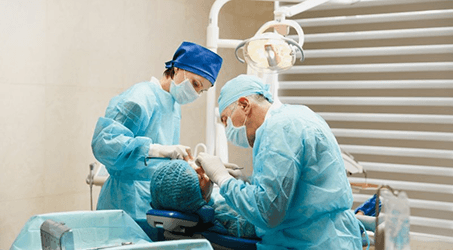
Some patients may require certain procedures before moving forward with getting their dental implants, such as gum disease therapy, bone grafting, or tooth extractions. Depending on the ones you need and how much they cost will influence the overall price of your process. Though these preliminary may raise the value of your treatment, they may be necessary for ensuring a successful and long-lasting smile.
You’ll then have to consider the surgery itself and the factors involved. For instance, the cost will change depending on where the implants will be placed and if you receive any sedation. While some dentists will refer patients out to a local specialist, our team can perform the entire process in-house, allowing you to save more time, money, and trouble.
The Parts of Your Dental Implant
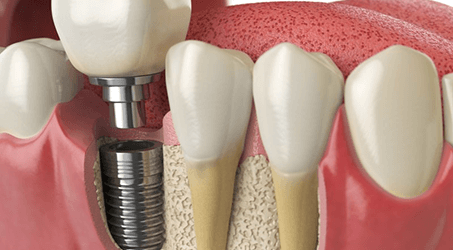
Here are several factors about your dental implants that should be considered:
- The number of implants: The more you receive, the higher the price.
- Type of restoration: Dental crowns will cost less than a full denture.
- Size or material: Whether your implants are made of zirconia or porcelain, or if they’re larger or shorter, can impact the overall price.
- Brand of dental implants: Our team only works with the highest quality materials to ensure long-lasting and natural-looking results.
How Dental Implants Can Save You Money

Although options like dentures and dental bridges may seem more cost-effective than dental implants, you’ll have to consider the need for replacements. The traditional solutions typically only last around a decade before needing to get new ones, which can cost you more money in the long run. Dental implants, however, can last several decades to a lifetime, allowing you to save more.
Does My Dental Insurance Cover Dental Implants

While dental insurance doesn’t usually cover implants, there may be some exceptions, such as the crown or denture that you’ll fit atop your metal post. That’s why you’ll want to confirm the details of your policy with your provider in case your benefits can help. In many cases, your insurance can cover a percentage of the treatment like the consultation and even the sedation. Our team can help you make the most of your plan if needed.
Making Dental Implants Affordable

If you don’t have insurance, you might consider exploring our alternative financing options. Our team offers an in-house membership plan that can give discounts on various dental services, including dental implants, without the hassle of deductibles or waiting periods. We’re also partnered with CareCredit which can help split the cost of your treatments into monthly payments that come with little-to-zero interest! Don’t hesitate to speak with our team to learn more about these options.
Dental Implants Post-Op Instructions

Dental implant work doesn’t end when the placement surgery is done. Once the implant posts are placed, you’ll need to undergo recovery – a step that’s crucial to your treatment’s success. Still, you don’t need to worry; you’ll find the dental implant post-op instructions from our Springdale office below. These guidelines should help you heal quickly and ensure your implants work well. So, please keep reading to learn them or call our office for more details.
What to Do Directly After Dental Implant Surgery

Right after Dr. Bollin places your dental implant(s), you need to leave the forming blood clot(s) alone. Touching it (or them) will just delay or even reverse your recovery. Having said that, remember to follow these rules:
- Keep your fingers and tongue away from the surgical site(s) for a few days.
- In the first 24 hours after surgery, don’t smoke.
- Don’t use drinking straws for a few days; their suction force may dislodge the blood clot.
- Avoid spitting and instead (if necessary) swallow your saliva or use a tissue for dabbing.
Common Side Effects When Recovering from Dental Implant Placement

You’ll face some mild side effects after your dental implants are placed, especially during the first three days or so. The most common ones include:
- General Discomfort – Once the surgery’s anesthesia wears off, your treatment site may ache. You can use store-bought pain relievers to ease this soreness.
- Intermittent bleeding – Very soon after placement, your treatment site(s) could bleed slightly. You can lessen this effect by applying gauze and light pressure.
- Gum or Facial Swelling – Roughly 72 hours post-surgery, your gums and face may swell. Please apply a cold compress to reduce the swelling if that happens.
To be clear, the above effects are temporary and should fade in a few days. Please contact our office if they don’t or if they get worse.
Your Diet After Dental Implant Surgery

Following the implant surgery, it’s best to stick to a soft food diet. Chewing tough meals could dislodge your blood clot and ruin your recovery.
Possible items to feature in your soft food diet are:
- Smoothies
- Scrambled Eggs
- Yogurt
- Soft Cheese
- (Non-hot) Soup
- Sweet Potatoes
- Mashed Potatoes
- Pasta
- Pudding
- Ice Cream
After a few weeks (or if you feel ready), you can resume a normal diet. However, please limit the crunchy and tough foods you have. You should also avoid chewing directly on the dental implant site(s).
Post-Op Health & Oral Hygiene

Despite your need for recovery, your mouth still requires daily cleaning. You should continue to practice good oral hygiene even as your implant site(s) heal. Having said that, follow these extra tips:
- Even as you brush your teeth twice daily, be careful of the surgical site(s).
- To keep the treatment site clean, rinse your mouth after eating 2-3 times daily. Consider using a prescription mouthwash if you have one.
- Don’t use a mouth rinse that has high levels of alcohol (i.e., Scope, Listerine, etc.)
What to Do After Your New Teeth Are Attached

When the new crown, bridge, or denture is attached, the hard stuff is finally over. The most you’ll face at that point is some minor gum sensitivity, which should fade quickly. You shouldn’t experience any swelling, bleeding, or extensive recovery. Rather, you can go out and enjoy your restored smile!
Maintaining Your Dental Implants

If you’ve invested in dental implants in Springdale, you’ve taken a massive leap towards better oral health and an improved quality of life. Our team at Sunset Avenue Dental wants you to be able to reap all of the benefits of undergoing this process for as long as possible. At each of your routine checkups and cleanings, we’ll make sure that your smile stays healthy. We’ve also outlined some helpful care tips for your newly restored smile below.
Prioritize Your Oral Hygiene

Just like your natural teeth, you’ll want to maintain a good at-home dental hygiene routine with your dental implants. Be sure to brush your teeth twice a day for at least two minutes to remove any build-up of food debris or bacteria. Use a soft-bristled toothbrush and regular, non-abrasive toothpaste. It’s also important to floss between your existing teeth and restorations at least once a day to prevent problems like decay and gum disease from developing.
Eat a Balanced Diet

The types of food you eat more regularly can also impact your gum health, which is why it’s a good idea to eat a balanced diet. Foods that are high in carbohydrates like sugars and starches can put you at a higher risk of developing oral infections, cavities, and gum disease. By occasionally substituting these snacks, like potato chips or sweets, for fresh fruits and vegetables, dairy, and lean proteins, you can help increase the lifespan of your new-and-improved smile.
Break Bad Oral Habits

Habits like nail-biting, chewing on the tips of pencils, and using your teeth to open packages or crunch on ice can all lead to accelerated wear and tear on your implant restorations. Other habits, like smoking and using tobacco products, can also put you at an increased risk of dental implant failure. We recommend being conscious of and taking steps towards curbing these as soon as possible to protect your implants.
Protect Your New Smile

Teeth grinding is estimated to impact up to 30 percent of the population. Whether you’re clenching and grinding during the day or while you’re sleeping, this can cause the destabilization of your dental implants, and ultimately their failure when left unchecked. To help protect your new investment, consider purchasing a custom-crafted nightguard to cushion your replacement teeth and protect your facial muscles and jaw joints from becoming strained.
Schedule Your Routine Checkups & Cleanings

In order to keep your smile fresh and healthy, routine checkups and cleanings with Dr. Bollin are essential. These visits will occur every six months and consist of thorough checkups by our team, routine X-rays, and professional, thorough dental cleanings.
Dental Implant Failure & Salvage

Dental implants are a predictably successful treatment; they do well in more than 95% of cases! Of course, it must be admitted that there is still the slight possibility of dental implant failure. If you ever believe that something is amiss with your new teeth, do not hesitate to call our team. We will carefully assess the situation and recommend your next steps. Our goal is to get your smile’s health and function back on track as soon as possible!
Learn More About Dental Implant Failure & Salvage
Dental Implant Technology

By using the latest technology available to our Sunset Avenue Dental team, we’re able to make your dental implant journey as precise, streamlined, and comfortable as possible. From antibacterial-coated implant posts to our putty-free digital impression system, we’re able to deliver outstanding results every time. You can learn more about this advanced technology below, and don’t hesitate to reach out to our team if you have any additional questions.
Antibacterial Coating

Post-operative infection following dental implant placement surgery is a top cause of failure. This is because when bacteria are left to accumulate along the gumline and surround the newly placed implant, an infection can develop. The infection can then lead to the deterioration of the soft and hard tissues that are essential for supporting and integrating your implant within your mouth, eventually serving as your new replacement tooth’s root.
While thorough post-operative oral hygiene can do a lot to protect against infection, we take an additional measure by covering our dental implant posts with an antibacterial coating. This helps add a second layer of protection as your implant is integrating with your jawbone and your gums are healing.
Digital Impression System

We want you to have an effortless experience when you decide to invest in dental implants in Springdale, and one of the ways we’re able to do that is by implementing putty-free digital impressions into our practice. Instead of filling a mouthpiece with putty that often triggers patients’ gag reflexes, our team is able to scan the inside of your mouth with a small digital camera. It will then create a photorealistic blueprint of your mouth that we can view on our chairside monitor, allowing us to make sure that every detail has been captured.
In addition to being a more comfortable way to take impressions, this digital technology also eliminates the need to mail impressions to our dental laboratory. Instead, we can send them a file that they can immediately view, allowing them to get to work on crafting your restoration much faster.
Advanced Dental Implant Procedures

Not everybody is a good candidate for dental implants right away. In fact, patients who are looking to upgrade their traditional restoration (like a dental bridge or denture), or those who have been dealing with tooth loss for quite some time before deciding to invest in dental implants often require preparatory treatments. These procedures help our team prepare your mouth to successfully receive your new dental implants, providing them with enough jawbone density to integrate with your jawbone for strong and unwavering support.
Bone Grafting
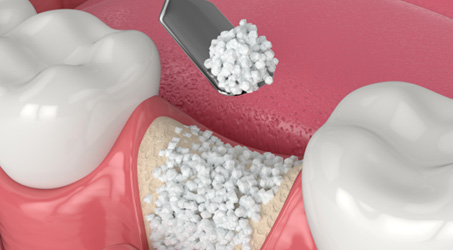
Each of your teeth has roots that are embedded within your jawbone, helping stimulate the bone and provide it with blood flow to help it continue regenerating throughout your life. When teeth go missing, the roots are no longer there to do this important job, so the jawbone begins to deteriorate over time, leaving it too thin to allow dental implants to fuse with it.
Our team will capture diagnostic images to view the density of your jawbone, and if we notice deterioration has occurred, it’s likely that you’ll need a bone graft. This procedure involves taking a very small piece of tissue from another area of the body and transplanting it into the weakened area of the jawbone. This graft will help the area create new cells and regenerate bone, providing enough of a foundation for our team to successfully place your dental implants.
It's important to note that we can’t jump right into implant surgery after your bone graft. You’ll need to make a full recovery from your grafting procedure, and the area will need enough time to repair itself. This can take between three and nine months.
Ridge Expansion
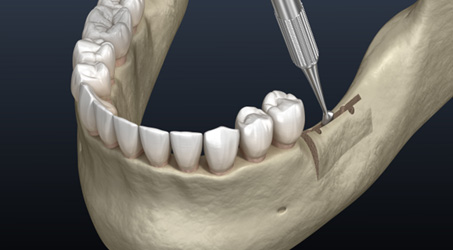
Your teeth are supported by the alveolar ridge, which is the thick, raised border of your mouth that extends from the upper and lower jaw and makes your lips jut out a little bit. This part of your jawbone provides reliable support for your teeth, but it can deteriorate due to tooth loss, aging, and even disease.
When the alveolar ridge erodes, there won’t be enough support for your dental implants to successfully fuse with the bone. In these cases, we would recommend a ridge expansion in Springdale. This process can typically be completed in-office under IV sedation and involves creating a wedge between the inner and outer pieces of bone. This will create a small enough space between them to slip grafting material in, allowing it to strengthen and become denser with time.
Dental Implant FAQs

We understand that committing to dental implants in Springdale is a big decision, which is why we aim to address any concerns or questions our patients have during their consultations so they can move forward with confidence. Below, we’ve compiled some of the most common questions we receive from our patients, along with our answers. If you don’t see the information you’re looking for, don’t hesitate to give our team a call !
How long do dental implants last?
Dental implants are a relatively modern treatment, so there aren’t many long-term studies available that truly capture the extent to which they can last. However, the ones that are available put the average lifespan of this treatment at 35 or more years, with some lasting for the remainder of patients’ lives.
While dental implants have a higher upfront cost than traditional dentures, they do minimize your dental expenses down the road with their longevity, making them an excellent option for patients looking for a more permanent treatment for missing teeth.
How successful are dental implants?
Dental implants boast an impressive 95% success rate after five years of placement. Before you undergo surgical placement, Dr. Bollin will go over your medical and oral health history with you and capture diagnostic images to ensure that you’re a good candidate for the treatment. In some cases, patients require preparatory procedures like bone grafts and sinus lifts to ensure the success of their dental implants.
Can I get dental implants if I have undergone cancer treatment?
If you’ve been diagnosed with oral cancer and have received radiation therapy in the head and neck area, you may be two to three times more likely to experience dental implant failure. However, if you received radiation therapy in other areas of the body besides the head and neck, you’ll likely be at a lower increased risk. Our team can collaborate with your oncologist to help decide whether dental implants are the best option for you.
Can I get dental implants if I have Osteoporosis?
Because osteoporosis can impact the osseointegration aspect of your dental implant procedure, it could affect your candidacy for the treatment. However, in some cases, a bone graft may be able to strengthen your fragile and porous jawbone area enough to be able to help you successfully undergo osseointegration, which is when your implants fuse with the bone.
Certain osteoporosis medications can also slow down the healing process after surgery, leading to dental implant failure. While having this condition doesn’t mean you’re not a good candidate, we will need to collaborate with your primary care physician or specialist to ensure that you have the best chances of successful treatment.
